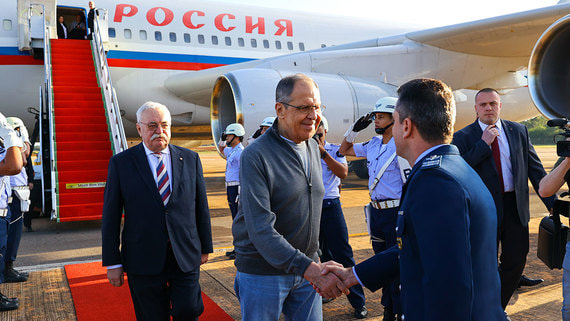Russia is ready to listen to Brazil’s peace initiatives
[ad_1]

Moscow is ready to listen to Brazil’s proposals to achieve peace in Ukraine, which will take into account Russia’s interests. This was announced on April 18 by the press secretary of the Russian President Dmitry Peskov, commenting on the plans of Brazilian President Luiz Inacio Lula da Silva to participate in resolving the Ukrainian conflict. Peskov’s statement was made against the backdrop of the start of the Latin American tour of Russian Foreign Minister Sergei Lavrov, which began from Brazil.
On April 16, Lula da Silva proposed to form a group of countries that would take on a mediating mission between Moscow and Kiev, “put an end to the war and establish peace.” The Brazilian leader has already conveyed this idea to Chinese President Xi Jinping and President of the United Arab Emirates (UAE) Sheikh Zayed Al Nahyan. In the near future, French President Emmanuel Macron plans to hand over his peace plan for Ukraine to the President of China and French President Emmanuel Macron, Bloomberg reported on April 18. But with regard to Macron’s plan, Peskov said only that nothing was known about him in the Kremlin.
Lavrov during his visit to Brazil met with Lula and his Brazilian counterpart Maura Vieira. The parties discussed the problems of global politics and agreed to cooperate in the UN, the Security Council, BRICS and the G20, as well as to coordinate the approaches of the foreign ministries of the two countries, the press service of the Russian Foreign Ministry reported. The Russian minister extended an invitation to the Brazilian President to visit the St. Petersburg International Economic Forum (SPIEF), which will be held from 14 to 17 June 2023.
In addition to Brazil, Lavrov will visit Venezuela, Nicaragua and Cuba. The choice of these countries by the Russian minister is not accidental: these states traditionally oppose or abstain from voting on anti-Russian resolutions at the UN General Assembly. And although at the last meeting on February 23, Brazilian representatives supported a resolution demanding the withdrawal of Russian troops “from the territory of Ukraine”, Lula repeatedly criticized Western elites for “unilateral actions” in the Ukrainian direction. In particular, on April 15, the Brazilian president accused the United States of “fueling” the conflict, and at the beginning of the month he said that “the status of Crimea is not negotiable.” These statements by Lula prompted accusations from a representative of the US National Security Council of playing along with Russia and China.
In its foreign policy, Brazil is trying to capitalize on the current geopolitical situation, Lazar Kheifets, professor at the Department of American Studies at the Faculty of International Relations at St Petersburg University, believes. “In recent decades, the republic has positioned itself as the leader of Latin America, and also sought to obtain permanent membership in the UN Security Council. The Ukrainian crisis opens up an additional window of opportunity to achieve these goals, while Western states bear reputational and material costs,” he said.
According to the expert, the development of Russian-Brazilian relations is in the interests of both states: on the one hand, Moscow is expanding trade and economic ties with the Latin American continent under sanctions, on the other hand, Russian rhetoric about breaking the unipolar world order in favor of polycentricity finds its grateful listeners among the inhabitants of Latin America. America. “Especially considering that for several decades the region was in almost complete political and economic dependence on Washington. The United States is strongly associated there with the dark period of military dictatorships in the countries of the continent,” Kheyfets added.
At the same time, the potential for expanding trade and economic ties between Russia and Latin America is large, continues Nikolai Kalashnikov, adviser to the director of the Institute of Latin America of the Russian Academy of Sciences. “Russia has been cooperating with this group of states in the oil and gas sector for a long time,” the expert recalls. – Potentially, Russian industrialists could offer local consumers heavy engineering products and weapons. The deepening of these ties, however, will depend on the results of the special operation in Ukraine.”
[ad_2]
Source link








